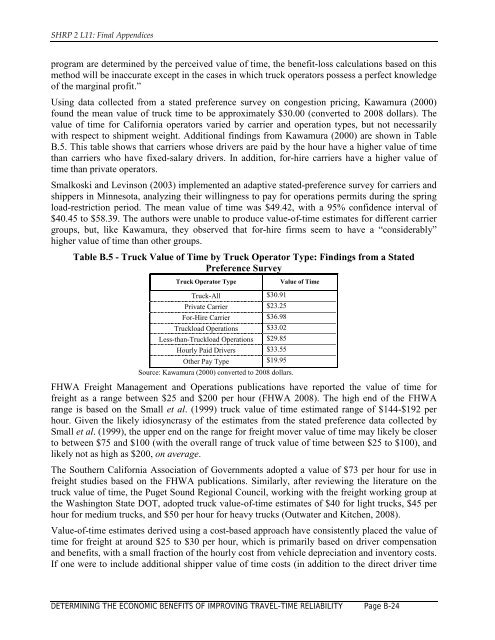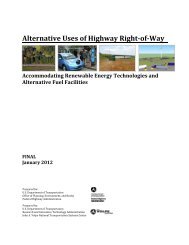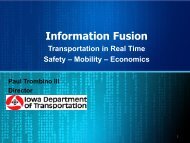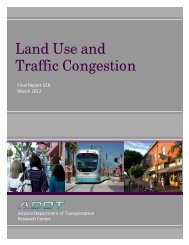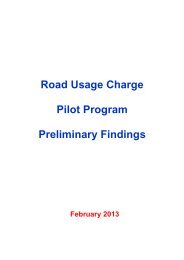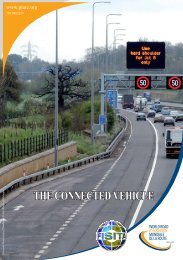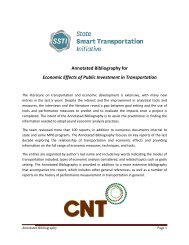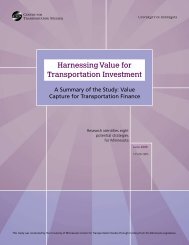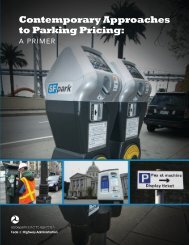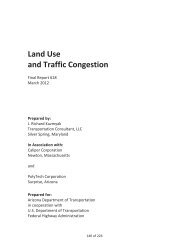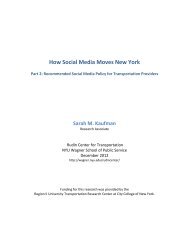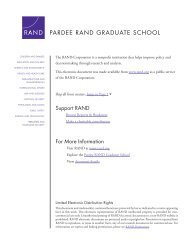Evaluating Alternative Operations Strategies to Improve Travel Time ...
Evaluating Alternative Operations Strategies to Improve Travel Time ...
Evaluating Alternative Operations Strategies to Improve Travel Time ...
Create successful ePaper yourself
Turn your PDF publications into a flip-book with our unique Google optimized e-Paper software.
SHRP 2 L11: Final Appendices<br />
program are determined by the perceived value of time, the benefit-loss calculations based on this<br />
method will be inaccurate except in the cases in which truck opera<strong>to</strong>rs possess a perfect knowledge<br />
of the marginal profit.”<br />
Using data collected from a stated preference survey on congestion pricing, Kawamura (2000)<br />
found the mean value of truck time <strong>to</strong> be approximately $30.00 (converted <strong>to</strong> 2008 dollars). The<br />
value of time for California opera<strong>to</strong>rs varied by carrier and operation types, but not necessarily<br />
with respect <strong>to</strong> shipment weight. Additional findings from Kawamura (2000) are shown in Table<br />
B.5. This table shows that carriers whose drivers are paid by the hour have a higher value of time<br />
than carriers who have fixed-salary drivers. In addition, for-hire carriers have a higher value of<br />
time than private opera<strong>to</strong>rs.<br />
Smalkoski and Levinson (2003) implemented an adaptive stated-preference survey for carriers and<br />
shippers in Minnesota, analyzing their willingness <strong>to</strong> pay for operations permits during the spring<br />
load-restriction period. The mean value of time was $49.42, with a 95% confidence interval of<br />
$40.45 <strong>to</strong> $58.39. The authors were unable <strong>to</strong> produce value-of-time estimates for different carrier<br />
groups, but, like Kawamura, they observed that for-hire firms seem <strong>to</strong> have a “considerably”<br />
higher value of time than other groups.<br />
Table B.5 - Truck Value of <strong>Time</strong> by Truck Opera<strong>to</strong>r Type: Findings from a Stated<br />
Preference Survey<br />
Truck Opera<strong>to</strong>r Type<br />
Truck-All $30.91<br />
Private Carrier $23.25<br />
For-Hire Carrier $36.98<br />
Truckload <strong>Operations</strong> $33.02<br />
Less-than-Truckload <strong>Operations</strong> $29.85<br />
Hourly Paid Drivers $33.55<br />
Other Pay Type $19.95<br />
Source: Kawamura (2000) converted <strong>to</strong> 2008 dollars.<br />
Value of <strong>Time</strong><br />
FHWA Freight Management and <strong>Operations</strong> publications have reported the value of time for<br />
freight as a range between $25 and $200 per hour (FHWA 2008). The high end of the FHWA<br />
range is based on the Small et al. (1999) truck value of time estimated range of $144-$192 per<br />
hour. Given the likely idiosyncrasy of the estimates from the stated preference data collected by<br />
Small et al. (1999), the upper end on the range for freight mover value of time may likely be closer<br />
<strong>to</strong> between $75 and $100 (with the overall range of truck value of time between $25 <strong>to</strong> $100), and<br />
likely not as high as $200, on average.<br />
The Southern California Association of Governments adopted a value of $73 per hour for use in<br />
freight studies based on the FHWA publications. Similarly, after reviewing the literature on the<br />
truck value of time, the Puget Sound Regional Council, working with the freight working group at<br />
the Washing<strong>to</strong>n State DOT, adopted truck value-of-time estimates of $40 for light trucks, $45 per<br />
hour for medium trucks, and $50 per hour for heavy trucks (Outwater and Kitchen, 2008).<br />
Value-of-time estimates derived using a cost-based approach have consistently placed the value of<br />
time for freight at around $25 <strong>to</strong> $30 per hour, which is primarily based on driver compensation<br />
and benefits, with a small fraction of the hourly cost from vehicle depreciation and inven<strong>to</strong>ry costs.<br />
If one were <strong>to</strong> include additional shipper value of time costs (in addition <strong>to</strong> the direct driver time<br />
DETERMINING THE ECONOMIC BENEFITS OF IMPROVING TRAVEL-TIME RELIABILITY Page B-24


